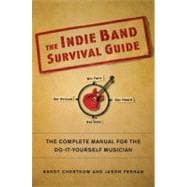
Note: Supplemental materials are not guaranteed with Rental or Used book purchases.
Purchase Benefits
What is included with this book?
Randy Chertkow (by day, a tech expert) and Jason Feehan (by day, an attorney) are lead members of Beatnik Turtle, a rock band based in Chicago, Illinois. Beatnik Turtle plays live, has produced eighteen albums, written music for TV, films, comedy shows at Second City, and has licensed music to ABC Family?all without a label.
| There Has Never Been a Better Time to Be a Musician | p. 1 |
| Get Prepared | p. 17 |
| Your Network | p. 19 |
| Your Brand | p. 33 |
| Your Web Site | p. 49 |
| Your Web Presence | p. 93 |
| Your Albums and Merchandise | p. 133 |
| Your Rights | p. 161 |
| Get Fans | p. 203 |
| Get Noticed | p. 205 |
| Get Booked and Play Live | p. 215 |
| Get Distributed and Sold | p. 245 |
| Get Played and Heard | p. 257 |
| Get Publicized | p. 299 |
| Conclusion | p. 329 |
| Acknowledgments | p. 331 |
| Table of Contents provided by Blackwell. All Rights Reserved. |
The New copy of this book will include any supplemental materials advertised. Please check the title of the book to determine if it should include any access cards, study guides, lab manuals, CDs, etc.
The Used, Rental and eBook copies of this book are not guaranteed to include any supplemental materials. Typically, only the book itself is included. This is true even if the title states it includes any access cards, study guides, lab manuals, CDs, etc.
Excerpted from The Indie Band Survival Guide: The Complete Manual for the Do-It-Yourself Musician by Randy Chertkow, Jason Feehan
All rights reserved by the original copyright owners. Excerpts are provided for display purposes only and may not be reproduced, reprinted or distributed without the written permission of the publisher.